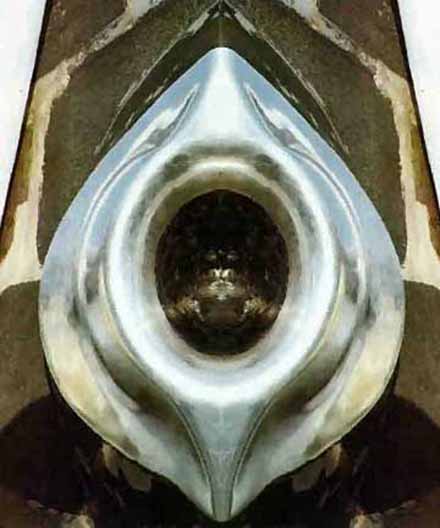The Death of Pan Πᾶν :
According to the Greek historian Plutarch (in De defectu oraculorum, "The Obsolescence of Oracles"),[24] Pan is the only Greek god (other thanAsclepius) who actually dies. During the reign of Tiberius (A.D. 14–37), the news of Pan's death came to one Thamus, a sailor on his way to Italy by way of the island of Paxi. A divine voice hailed him across the salt water, "Thamus, are you there? When you reach Palodes,[25] take care to proclaim that the great god Pan is dead." Which Thamus did, and the news was greeted from shore with groans and laments.
Robert Graves (The Greek Myths) reported a suggestion that had been made by Salomon Reinach[26] and expanded by James S. Van Teslaar[27] that the hearers aboard the ship, including a supposed Egyptian, Thamus, apparently misheard Thamus Panmegas tethneke 'the all-great Tammuz is dead' for 'Thamus, Great Pan is dead!', Thamous, Pan ho megas tethneke. "In its true form the phrase would have probably carried no meaning to those on board who must have been unfamiliar with the worship of Tammuz which was a transplanted, and for those parts, therefore, an exotic custom."[28]Certainly, when Pausanias toured Greece about a century after Plutarch, he found Pan's shrines, sacred caves and sacred mountains still very much frequented. Christian apologists, however, took Plutarch's notice to heart, and repeated and amplified it until the 18th century.[29] It was interpreted withconcurrent meanings in all four modes of medieval exegesis: literally as historical fact, and allegorically as the death of the ancient order at the coming of the new. Eusebius of Caesarea in his Praeparatio Evangelica (book V) seems to have been the first Christian apologist to give Plutarch's anecdote, which he identifies as his source, pseudo-historical standing, which Eusebius buttressed with many invented passing details that lent verisimilitude.
The cry "Great Pan is dead" has appealed to poets, such as John Milton, in his ecstatic celebration of Christian peace, On the Morning of Christ's Nativity line 89,[30] Elizabeth Barrett Browning,[31] and the character Grover in the Percy Jackson series by Rick Riordan as he desperately searches the world for any sign that Pan might still be alive.[32][33]
Being revealed: (The second coming)
The falcon cannot hear the falconer;
Things fall apart; the centre cannot hold;
Mere anarchy is loosed upon the world,
The blood-dimmed tide is loosed, and everywhere
The ceremony of innocence is drowned;
The best lack all conviction, while the worst
Are full of passionate intensity.
Surely some revelation is at hand;
Surely the Second Coming is at hand.
The Second Coming! Hardly are those words out
When a vast image out of Spiritus Mundi
Troubles my sight: somewhere in sands of the desert
A shape with lion body and the head of a man,
A gaze blank and pitiless as the sun,
Is moving its slow thighs, while all about it
Reel shadows of the indignant desert birds.
The darkness drops again; but now I know
That twenty centuries of stony sleep
Were vexed to nightmare by a rocking cradle,
And what rough beast, its hour come round at last,
Slouches towards Bethlehem to be born?
The Black Stone
The Black Stone (called الحجر الأسود al-Hajr al-Aswad in Arabic) is a Muslim relic, which according to Islamic tradition dates back to the time of Adam and Eve. Historical research claims that the Black Stone marked the Kaaba as a place of worship during pre-Islamic pagan times.[1][2] It is the eastern cornerstone of the Kaaba, the ancient stone building towards which Muslims pray, in the center of the Grand Mosque in Mecca, Saudi Arabia.[3] The Stone is a dark rock, polished smooth by the hands of millions of pilgrims, that has been broken into a number of fragments cemented into a silver frame in the side of the Kaaba. Although it has often been described as a meteorite, this hypothesis is still under consideration.[4]
Muslim pilgrims circle the Kaaba as part of the Tawaf ritual of the Hajj. Many of them try, if possible, to stop and kiss the Black Stone, emulating the kiss that Islamic tradition records that it received from the Islamic Prophet Muhammad.[5] If they cannot reach it, they point to it on each of their seven circuits around the Kaaba.
The mind has mountains:
No worst, there is none. Pitched past pitch of grief,More pangs will, schooled at forepangs, wilder wring.
Comforter, where, where is your comforting?
Mary, mother of us, where is your relief?
My cries heave, herds-long; huddle in a main, a chief
Woe, world-sorrow; on an age-old anvil wince and sing —
Then lull, then leave off. Fury had shrieked ‘No ling-
ering! Let me be fell: force I must be brief’.
O the mind, mind has mountains; cliffs of fall
Frightful, sheer, no-man-fathomed. Hold them cheap
May who ne’er hung there. Nor does long our small
Durance deal with that steep or deep. Here! creep,
Wretch, under a comfort serves in a whirlwind: all
Life death does end and each day dies with sleep.
God's Grandeur
| THE WORLD is charged with the grandeur of God. | |
| It will flame out, like shining from shook foil; | |
| It gathers to a greatness, like the ooze of oil | |
| Crushed. Why do men then now not reck his rod? | |
| Generations have trod, have trod, have trod; | 5 |
| And all is seared with trade; bleared, smeared with toil; | |
| And wears man’s smudge and shares man’s smell: the soil | |
| Is bare now, nor can foot feel, being shod. | |
| And for all this, nature is never spent; | |
| There lives the dearest freshness deep down things; | 10 |
| And though the last lights off the black West went | |
| Oh, morning, at the brown brink eastward, springs— | |
| Because the Holy Ghost over the bent | |
| World broods with warm breast and with ah! bright wings. |
Psyche was one of three sisters, princesses in a Grecian kingdom. All three were beautiful, but Psyche was the most beautiful. Aphrodite, the goddess of love and beauty, heard about Psyche and her sisters and was jealous of all the attention people paid to Psyche. So she summoned her son, Eros, and told him to put a spell on Psyche.Always obedient, Eros flew down to earth with two vials of potions. Invisible, he sprinkled the sleeping Psyche with a potion that would make men avoid her when it came to marriage. Accidentally, he pricked her with one of his arrows (which make someone fall in love instantly) and she startled awake. Her beauty, in turn, startled Eros, and he accidentally pricked himself as well. Feeling bad about what he had done, he then sprinkled her with the other potion, which would provide her with joy in her life.
The so-called psyche or butterfly is generated from caterpillars which grow on green leaves, chiefly leaves of theraphanus, which some call crambe or cabbage. At first it is less than a grain of millet; it then grows into a small grub; and in three days it is a tiny caterpillar. After this it grows on and on, and becomes quiescent and changes its shape, and is now called a chrysalis. The outer shell is hard,and the chrysalis moves if you touch it. It attaches itself by cobweb-like filaments, and is unfurnished with mouth or any other apparent organ. After a little while the outer covering bursts asunder, and out flies the winged creature that we call the psyche or butterfly. (From Aristotle's History of Animals 551a.1)
Sure enough, Psyche, although still beautiful, could find no husband. Her parents, afraid that they had offended the gods somehow, asked an oracle to reveal Psyche's future husband. The oracle said that, while no man would have her, there was a creature on the top of a mountain that would marry her.
Surrendering to the inevitable, she headed for the mountain. When she came within sight, she was lifted by a gentle wind and carried the rest of the way. When she arrived, she saw that her new home was in fact a rich and beautiful palace. Her new husband never permitted her to see him, but he proved to be a true and gentle lover. He was, of course, Eros himself.
After some time, she grew lonely for her family, and she asked to be allowed to have her sisters for a visit. When they saw how beautiful Psyche's new home was, they grew jealous. They went to her and told her not to forget that her husband was some kind of monster, and that, no doubt, he was only fattening her up in order to eat her. They suggested that she hide a lantern and a knife near her bed, so that the next time he visited her, she could look to see if he was indeed a monster, and cut off his head if it was so.
Her sisters convinced her this was best, so the next time her husband came to visit her, she had a lamp and a knife ready. When she raised the lamp, she saw that her husband was not a monster but Eros! Surprised, he ran to the window and flew off. She jumped out after him, but fell the ground and lay there unconscious.
When she awoke, the palace had disappeared, and she found herself in a field near her old home. She went to the temple of Aphrodite and prayed for help. Aphrodite responded by giving her a series of tasks to do -- tasks that Aphrodite believed the girl would not be able to accomplish.
The first was a matter of sorting a huge pile of mixed grains into separate piles. Psyche looked at the pile and despaired, but Eros secretly arranged for an army of ants to separate the piles. Aphrodite, returning the following morning, accused Psyche of having had help, as indeed she had.
The next task involved getting a snippet of golden fleece from each one of a special herd of sheep that lived across a nearby river. The god of the river advised Psyche to wait until the sheep sought shade from the midday sun. Then they would be sleepy and not attack her. When Psyche presented Aphrodite with the fleece, the goddess again accused her of having had help.
The third task Aphrodite set before Psyche was to get a cup of water from the river Styx, where it cascades down from an incredible height. Psyche thought it was all over, until an eagle helped her by carrying the cup up the mountain and returning it full. Aphrodite was livid, knowing full well that Psyche could never have done this alone!

Psyche's next task was to go into hell to ask Persephone, wife of Hades, for a box of magic makeup. Thinking that she was doomed, she decided to end it all by jumping off a cliff. But a voice told her not to, and gave her instructions on making her way to hell to get the box. But, the voice warned, do not look inside the box under any circumstances!
Well, Psyche received the box from Persephone and made her way back home. But, true to her nature, she was unable to restrain herself from peeking inside. To her surprise, there was nothing inside but darkness, which put her into a deep sleep. Eros could no longer restrain himself either and wakened her. He told her to bring the box to Aphrodite, and that he would take care of the rest.
Eros went to the heavens and asked Zeus to intervene. He spoke of his love for Psyche so eloquently that Zeus was moved to grant him his wish. Eros brought Psyche to Zeus who gave her a cup of ambrosia, the drink of immortality. Zeus then joined Psyche and Eros in eternal marriage. They later had a daughter, who would be named Pleasure.
Phyche - Soul (Image of a butterfly)
Great stories came from dreams





No comments:
Post a Comment